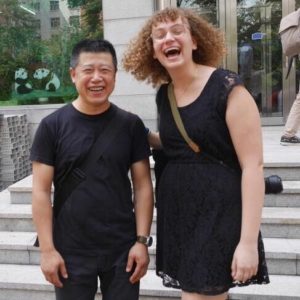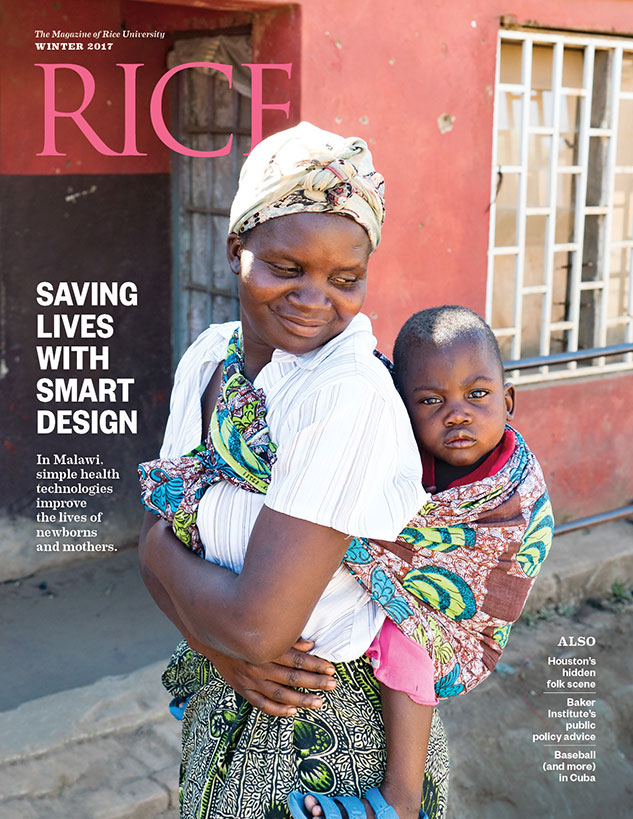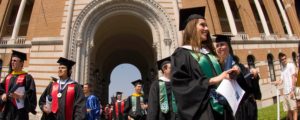
My one-on-one photography class professor, 孙老师, and me, relieved after a long and grueling semester.
Senior Taylor Ginter is majoring in Asian studies and minoring in math. She spent her first summer away from her hometown, Tucson, in Harbin, China through CET’s intensive language program. The program requires that students take a full-time language pledge, which dictates that students speak only in Chinese, from classes to meal times to weekend excursions. Ginter is continuing with CET Harbin for the fall semester, but will return to Rice in the spring for her last semester. The following is a post from her blog, Half a Year in Harbin, where Ginter is documenting her adventures in language, culture and travel.
My last week in Harbin for the summer semester was so hectic that I’ve only now, three days after leaving, had enough time to fully process and reflect on everything that happened. Also, I’ve been in Tokyo for the past few days, but that story will be in my next post, hopefully written tomorrow on my bullet train ride to Hiroshima.
Monday and Tuesday were my last two days of classes, spent reviewing the semester’s material. I was feeling disappointed in myself because I had forgotten so much vocabulary and grammar. Actually, not “forgotten,” but rather I had never completely learned and internalized the material in the first place. The hours upon hours I had spent during the semester seemed fruitless. I made a plan to tediously review as much as I could over the next 48 hours, determined to harvest something juicy to eat.
I decided to start with my Chinese newspaper reading class by rereading every lesson’s text and checking for understanding. I had started the semester in the lowest level classes, but after one week my teachers placed me in harder classes, thus I had missed the first newspaper text, “Imports, Exports, and GDP,” and learned it by myself. So when I went to review it, about a quarter of the words were underlined with their English definitions written on the side because I didn’t know them at the time. But looking back at this text after two months of intense studying I realized that I not only knew what most of the underlined words meant, but I actually had been using them in everyday conversations — I was shocked! After reviewing the second and third texts I realized that the same phenomenon kept happening.
 I’m a very progress oriented worker, so when change is gradual and hard to observe I become very discouraged. Yeah, by the end of the semester I noticed myself having slightly longer and more frequent conversations with Chinese people, but I still felt so far from where I thought I was supposed to be after two months. I shouldn’t have been so hard on myself, though, because at our end of the semester graduation banquet I won the “Most Improved” award out of everyone in the program! All my teachers told me they were extremely worried about me when the semester started, but that I proved them wrong throughout the course of eight weeks. It felt great to be recognized for all the work I’d put in over the semester, but this just raises my standards even higher for this fall semester. I know the pace and expectations of CET classes, and I’m already adjusted to life in Harbin, so I’m hoping I can make even more progress in my 16-week program.
I’m a very progress oriented worker, so when change is gradual and hard to observe I become very discouraged. Yeah, by the end of the semester I noticed myself having slightly longer and more frequent conversations with Chinese people, but I still felt so far from where I thought I was supposed to be after two months. I shouldn’t have been so hard on myself, though, because at our end of the semester graduation banquet I won the “Most Improved” award out of everyone in the program! All my teachers told me they were extremely worried about me when the semester started, but that I proved them wrong throughout the course of eight weeks. It felt great to be recognized for all the work I’d put in over the semester, but this just raises my standards even higher for this fall semester. I know the pace and expectations of CET classes, and I’m already adjusted to life in Harbin, so I’m hoping I can make even more progress in my 16-week program.
Our language pledge ended Saturday afternoon and afterwards was so. weird. Although we were allowed to speak English, most of us didn’t at first! But as we reluctantly eased back into our native language it was awkward for three reasons. 1. We were stumbling over English grammar and speaking in Chinglish. Whatever language a word first came to mind in was which language we used. 2. People’s average pitch of voice was different — most people in our program’s Chinese voice was higher pitched than their English voices. And 3. People have different personalities when speaking different languages! Some are wildly more outgoing in Chinese, while some are much better mannered (maybe they just don’t know any Chinese curse words?). Oh! It was also so unsettling to use our English names; I actually cringed when someone called me “Taylor” for the first time.

Saint Sofia Cathedral at night. Located in the central district of Daoli, Harbin City, Heilongjiang Province, China. Photo: Shutterstock
Somehow, in between finals and our graduation ceremony and going to a night market (where I ate so much fried food I thought I was at a US state fair) and karaoke (I’ll admit, I sang English songs the night before our language pledge officially ended…I just don’t know enough Chinese ones!), I managed to pack up my dorm room and say goodbye to everyone before leaving for the airport. I have a total of about three weeks off between my summer and fall semesters, so I’m in Japan for the first half and then Taiwan afterwards. From Harbin, my route was to Beijing Saturday night, then Sunday morning to Tokyo. The ticket I had bought out of Harbin was pretty soon after CET’s program ended — I was one of the first students to leave — so it was a bit of a rush to make it to the airport in time on Saturday evening.
 Luckily, my flight to Beijing kept getting delayed, allowing me to relax about time. Unluckily, my flight to Beijing kept getting delayed, so I was worried I wasn’t going to be able to make my flight to Tokyo. I was already exhausted from running around all day Saturday but couldn’t sleep in the airport because my boarding gate kept getting moved. Crankily, I started asking myself why I was taking this vacation by myself; it would have been so much easier, more straightforward, and cheaper to stay in my Harbin dorm room and catch up on sleep for three weeks. And I didn’t even have a plan for god’s sake! All I’d bought at that time were my plane tickets to Japan and Taiwan; I didn’t know where I was sleeping or even what city I was going to end up in. And this is my first solo international trip! Sure, I’ve been to other US cities for a couple of days by myself, but that’s where I speak the language and know the customs.
Luckily, my flight to Beijing kept getting delayed, allowing me to relax about time. Unluckily, my flight to Beijing kept getting delayed, so I was worried I wasn’t going to be able to make my flight to Tokyo. I was already exhausted from running around all day Saturday but couldn’t sleep in the airport because my boarding gate kept getting moved. Crankily, I started asking myself why I was taking this vacation by myself; it would have been so much easier, more straightforward, and cheaper to stay in my Harbin dorm room and catch up on sleep for three weeks. And I didn’t even have a plan for god’s sake! All I’d bought at that time were my plane tickets to Japan and Taiwan; I didn’t know where I was sleeping or even what city I was going to end up in. And this is my first solo international trip! Sure, I’ve been to other US cities for a couple of days by myself, but that’s where I speak the language and know the customs.
But I always start second guessing my choices and my capabilities when faced with adversity. I always want to give up on my plans and instead do what is comfortable, what I already know. However, a girl in line at the airport was wearing a shirt that said something along the lines of “The only way to have no fears is to face your fears” and, cheesy as it is, that sentiment really stuck with me. Most of the time after I do something I’ve been dreading it turns out to be not nearly as bad as I expected it to be.
So I was sulking in the Harbin airport trying to turn my cranky, apprehensive mood around when a family of four sat down next to me. Well, only the parents sat down, because the kids were throwing and kicking a bottle cap around. Out of all the toys their mom probably had in her bag, they were playing with a piece of plastic trash! Their imagination and livelihood entranced me. I usually prefer cats to kids, but when they plopped down for a water break I actually wanted to talk to them. Of course they were too shy to respond to this weird stranger talking to them, so I asked their mom how old they were and she and I talked for a minute until the family left to go to another gate.
The woman on my other side had heard me speaking Chinese, though, and was intrigued. She had a heavy southern accent so I had a hard time understanding her at first and was dreading having to ask her to repeat herself multiple times. But I think she sensed my issue and spoke a little slower and more clearly, so I didn’t have any problems; we ended up speaking for an hour and a half in Chinese! And I only had to ask her to repeat herself probably a total of three times throughout the conversation!! It was so natural and easy. She also loved taking selfies, so we took like thirty (using an app to make us look whiter, in true Chinese fashion, of course). The time to board my plane had finally come, so I triumphantly left the Harbin airport lacking any crankiness or self doubt: that conversation felt like more of a final exam than any piece of paper a CET teacher had put in front of me that week, and I proved to myself that yeah, in this semester of Chinese classes maybe I have learned a thing or two or three or a whole hour and a half of real life conversation’s worth.






